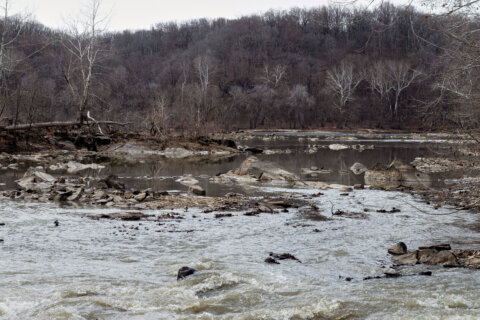On snowy road surfaces, road salt does the trick to provide better traction.
“Road salt is mostly sodium chloride, just like the table salt you put on your food,” said Sujay Kaushal, a professor of geology at University of Maryland. “Ions in the salt — little particles — squeeze themselves in between the water when it’s freezing, so that the water has trouble forming a crystal of ice.”
However, Kaushal and fellow researchers from Maryland’s College of Computer, Mathematical, and Natural Sciences say the influx of salt in freshwater streams and rivers poses an “existential threat” to drinking water if current trends continue.
“The salinity of some streams in our region during winter months can get up to a quarter or half the salinity that you see in the Chesapeake Bay, because of the salt buildup and salt accumulation,” Kaushal told WTOP.
Kaushal said excess salt in local watersheds “routinely exceeds thresholds for aquatic life,” however it hasn’t been closely monitored in drinking water sources: “Salt is unregulated right now, as a primary contaminant in drinking water.”
“Our major drinking water sources in our region — the Potomac, the Patuxent, the Occoquan Reservoir, the Baltimore reservoir systems — all show salinization trends over time,” said Kaushal.
He said once salt contaminates a drinking water source, it can’t be removed by current drinking water treatment.
Kaushal said while it’s possible in a laboratory setting, “Removing salt from water is very expensive, very energy intensive, and the brine — the water that’s produced as a byproduct of removing the salt is extremely salty, so there’s questions about where to dispose of that really salty water.”
As for possible solutions, Kaushal said Massachusetts has instituted restrictions on where road salt can be applied, in developments and construction near bodies of water.
“If we basically reduced or restricted the use of salt in those areas, we can have some effect,” Kaushal said.
Other steps would be ensuring that trucks spreading salt are well-calibrated.
“We can figure out how much salt that we need to deliver, and not overdo it,” Kaushal said. “I’m sure you’ve probably seen piles of salt on the road that were applied all at once.”
Some jurisdictions, including D.C., use beet juice during pretreatment of roads.
Get breaking news and daily headlines delivered to your email inbox by signing up here.
© 2024 WTOP. All Rights Reserved. This website is not intended for users located within the European Economic Area.








